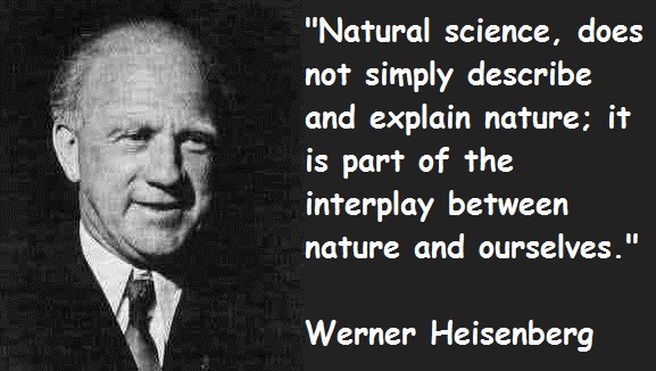|
with Rich Piscopo The Certainty of Uncertainty In keeping with our discussion on what constitutes a fact, I introduced the concept of The Heisenberg Uncertainty Principle. Werner Heisenberg was a physicist who said the electrons with which we use to observe the reactions of sub-atomic phenomenon affect the very phenomenon we are observing. Therefore, we cannot be certain that we are observing the phenomenon objectively, as it is in and of itself. We extrapolated that concept to our larger existence. When we observe a deer, for instance, how do we know our presence does not affect the deer's behavior? Are we observing the deer objectively, as it is in and of itself? One student said, "That kind of doubt can be applied to anything. For example, maybe this table in front of us turns into a chair when we stop seeing it." Then another offered an example, "Or, like the movie Toy Story, where all of the toys come to life after the humans leave the room." Then yet another offered a third example, "Maybe the kitchen appliances talk to each other after we leave the kitchen." This wonderful exercise in imagination led the second student to add, "I always wanted to be in the mind of a dog." I praised her for her creative curiosity, for this perspective leads one to see the world from another's point of view; to imagine what it would be like to walk in another's shoes. I went on to say that this ability to see the world from another's point of view is critical to a healthy society. We could surely use that ability in our current Congress, and in dealing with the current crisis in Ukraine. The fact that our students have this capacity to be open to another point of view gives me hope for the future. Soon enough, our students will be allowed to vote. They will have the power to effect change. With their rational perspective, I have faith they will bring about positive change; change that can defeat ignorance; change that will bring light into the world. Monday's dialogue demonstrates how philosophy is so much more than an intellectual exercise. Studying philosophy develops reasoning skills. Good reasoning skills lead to good citizenship. And, good citizenship leads to a healthy society. Therefore, studying philosophy leads to a healthy society. Comments are closed.
|
Categories
All
Archives
May 2016
|

 RSS Feed
RSS Feed